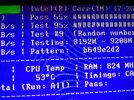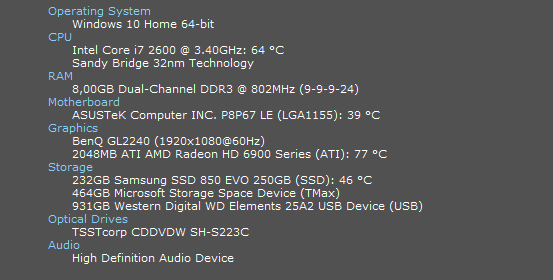-
Hi there and welcome to PC Help Forum (PCHF), a more effective way to get the Tech Support you need!
We have Experts in all areas of Tech, including Malware Removal, Crash Fixing and BSOD's , Microsoft Windows, Computer DIY and PC Hardware, Networking, Gaming, Tablets and iPads, General and Specific Software Support and so much more.
Why not Click Here To Sign Up and start enjoying great FREE Tech Support.
This site uses cookies. By continuing to use this site, you are agreeing to our use of cookies. Learn More.
Solved Frequent BSoDs
- Thread starter ZephyrCorsair
- Start date
You are using an out of date browser. It may not display this or other websites correctly.
You should upgrade or use an alternative browser.
You should upgrade or use an alternative browser.

- Status
- Not open for further replies.
Sorry about the delay, at this point while you await someone to respond to this thread, you could create a new thread in the malware area to check if there is any infection. I have sent out a message to the BSOD people to have a look at your thread.
It's not malware, I reinstalled windows and everything and I've run a million malware checks before that. It's got to be something in the hard ware or maybe drive related. I'm not that good with computers but it cant be malware if even a clean slate computer still crashes.
I think it best to test your Ram Modules. Here is a Full Tutorial video I was able to grab from Youtube. Let us know the outcome....
A friend of mine talked about the watt of my PSU or something, that maybe the problem was my PSU. But sure, I'll try that.
Sorry about the delay. Had a real busy few days.
Your graphics card is drawing 200W. What PSU do you have? Brand, wattage?
Faulty RAM sticks will cause an excessive amount of BSODs as the data collides and can't be written properly. I would test the RAM sticks with MemTest86+ before anything else.
Your graphics card is drawing 200W. What PSU do you have? Brand, wattage?
Faulty RAM sticks will cause an excessive amount of BSODs as the data collides and can't be written properly. I would test the RAM sticks with MemTest86+ before anything else.
I think it best to test your Ram Modules. Here is a Full Tutorial video I was able to grab from Youtube. Let us know the outcome....
I seem to get to a different BIOS screen, I assume it's because I use win10. What do I do?
Not all BIOS screens will display the same.
How are you attempting to run Memtest86 USB or DVD?
All that you need to do is set that to boot first. Then insert the software and allow it to boot and test the RAM.
Let it test it several times just once may give you a false reading.
How are you attempting to run Memtest86 USB or DVD?
All that you need to do is set that to boot first. Then insert the software and allow it to boot and test the RAM.
Let it test it several times just once may give you a false reading.
I used USB, it's running memtest, it's just that he picked some option of running USB before hard drive. I'm not sure if that's important or if I just skipped that or whatever.
Yes you do need to have the USB boot before the HDD for to work properly.it's just that he picked some option of running USB before hard drive.
Looks like you got it since it is running.I used USB, it's running memtest,
Is this what this number refers to? (Test #9)Let it test it several times just once may give you a false reading.
Attachments
A good rule of thumb is to let it run between 2 and 5 hours. Doing so will increase the chances of catching any faults in the RAM modules 
No that is the test number that it is currently on. There are several test that the software will preform.Is this what this number refers to? (Test #9)
Pass will tell you how many pass's the software has completed its run all the way through.
http://www.fractal-design.com/home/product/power-supplies/discontinued-products/tesla-650w-80-plus
This is my PSU, I think...
This is my PSU, I think...
A month ago or a bit more, when I reinstalled my computer, but BSoDs were still there after that. I changed thermal paste as well.
So looking at your PSU, it's not the greatest. It's 6 years old. It also emits a lot of heat on the cables. Here's a review of it and it's shortcomings. The heat on the cables is probably why it's so hot inside your case.
If your RAM checks out, you might want to consider looking at your PSU. All these BSODs point to a hardware fault, not software. These will be one of five items:
If your RAM checks out, you might want to consider looking at your PSU. All these BSODs point to a hardware fault, not software. These will be one of five items:
- Bad RAM
- Bad PSU
- Bad Motherboard
- Bad Hard Drive
- Bad Graphics Card
- Status
- Not open for further replies.


